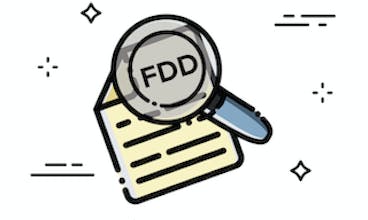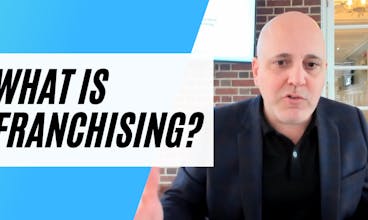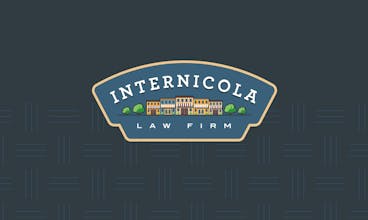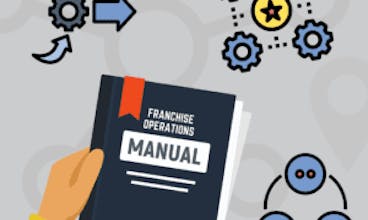Whether you’re a successful entrepreneur considering franchising your business or a go-getter thinking about buying a franchise, franchising can be a great option for building and growing a business.
As one of the most successful business models in the United States, franchising is both a legal and business framework that’s focused on growth, expansion, unit-level economics, and opportunity. Like any important business decision, though, franchising can have advantages and disadvantages depending on your individual goals. Franchising isn’t for everyone, and it’s important to understand its benefits and risks before jumping in.
In this article and video (above), you’ll learn about the advantages and disadvantages of franchising so you can make the best decision for yourself and your business.
The Advantages and Disadvantages of Franchising Depends on Whether You’re a Franchisor or Franchisee
Understanding the difference between franchisors and franchisees is important for evaluating and determining the advantages and disadvantages of franchising.
A franchisor is someone looking to scale and grow a business by selling a franchise. A good example of a franchisor is the corporate team behind major brands like McDonald’s and Dunkin’ Donuts. As a franchisor, when you franchise your business, you’ll be the one granting others the rights and license to open their own locations using your established brand, adhering to your operations systems, and relying on your support to run their franchise location.
A franchisee is a person buying a franchise. As a franchisee, you’re seeking new business opportunities and looking to join an established brand that ideally has a great track record, team, and plan for success. As a franchisee, when you buy a franchise, you’ll be investing your capital, time, and managerial efforts in developing and opening a new franchised location.
The advantages and disadvantages of franchising depend on who you are, your goals, and whether you are a franchisor or franchisee. Below, we provide a deep dive into the advantages and disadvantages of franchising.
Advantages of Franchising Your Business
Franchising is ideal for existing brands that have a strong track record of success, with consistent cash flow and solid unit-level economics. For successful business owners looking to grow or scale their established brand by opening additional new locations, franchising can be a smart move that comes with several advantages.
1. Growth and unit expansion
Unlike opening additional locations the organic way, where a business owner invests more of their own capital or takes on a business partner, franchising allows businesses to scale by selling franchise opportunities to franchisees. Although franchisors still provide franchisees with resources for running their franchised locations, franchising creates a franchisor-franchisee relationship that provides a good legal barrier and doesn’t carry the same risks as a joint venture while growing your business.
2. Capital
For business owners, franchising can help reduce some of the financial burdens associated with growing a business. Unlike organic growth, where an entrepreneur continues investing more of their own capital as they open new locations, franchising provides opportunities for unit-level expansion where the franchisee supplies the capital for the franchised location they bought. Franchisees pay an initial fee to join the franchise network, and they invest their own capital to develop and open their location.
3. Managerial talent
Every business owner knows how difficult it can be to onboard new, qualified team members and managers as your business grows. Franchising helps solve that problem by shifting hiring responsibilities to franchisees, who handle the process of hiring new managers and employees at each franchise location. Franchisees have an incentive to hire and retain quality staff at their locations because their income depends on having a consistent and high-quality team.
4. System scalability and supply chain
As the number of franchise locations operating under your brand increases, so does your ability to leverage the supply chain. This can mean negotiating better pricing from suppliers due to larger and more consistent orders, and potentially rebates or other programs and incentives that can benefit you as the franchisor, as well as your franchisees.
5. Legal protections
Unlike joint ventures, franchising is regulated by laws at both the federal and state levels. Franchisors adopt a Franchise Disclosure Document (FDD) when franchising their business. With the right legal team and compliance with regulations and laws, those legal regulations can become a shield rather than a liability.
6. Exit strategy
As your franchise and brand recognition grows over time, its assets, private equity, EBITDA cash flow, and other revenue streams could take on a higher level of valuation. Even if you have no plans of selling your franchise in the early stages of franchising, every good franchise system should be built to sell.
Disadvantages of Franchising Your Business
Although there are plenty of benefits for business owners when selling franchise opportunities to grow their brand, it’s still important to weigh the responsibilities and potential disadvantages that can come with franchising.
1. Initial capital investment
Every new business, whether it’s a franchise or an independent company, requires capital to start. Franchisors will have to invest their own capital at first to get their franchise off the ground. You’ll also need to work with an experienced legal team to develop your franchise program, prepare your FDD, and set up your corporate structure. Initial capital investments can range anywhere from $25,000 to $100,000 or more. Learn more about the cost of franchising your business.
2. Ongoing capital investment
Although some companies claim you’ll be able to start making money right away off your franchise system, that isn’t necessarily the case. Franchisors should plan a five year success plan when starting their franchise.
Franchise sales
During your first year as a franchisor, you should expect to invest your own capital into developing an FDD and strategically positioning your offerings, setting up a website, and developing an initial franchise sales marketing plan. Even if you’re focused on organic growth in the first year, you should still expect your initial costs to include PR and digital marketing.
Franchise development
In the second year, you’ll continue developing your franchise offerings. This means investing more capital into promoting the brand support you offer to franchisees, developing your franchise system, and building your team. Over time, franchisors will continue to build their brand, but you should expect the first two years at minimum to be an uphill climb that requires the initial investment of your own capital to succeed.
3. Time commitment
Every new business requires a time commitment from its owners, and franchising is no exception. You should plan to invest time and energy into franchise development, legal compliance, team building, marketing, education, and networking with franchise brokers.
4. Control
Unlike operating an independent business, franchisors may lose a little bit of control over their business when franchising. Good franchising agreements and solid FDDs can help franchisors retain control over their brand by creating operating territories for each franchise, setting guidelines, and establishing an approval process for franchisees’ activities. Still, you should plan to occasionally have to deal with noncompliant franchisees, so it’s important to consider the tradeoffs before franchising your brand.
5. Legal regulation
When franchisors fail to comply with laws and regulations, the regulations that govern franchises at the federal and state level can become a liability. Franchisors can turn those regulations into assets, though, by taking the right steps and working with a good legal team.
Advantages of Buying a Franchise
The advantages of purchasing a franchise rely heavily on choosing the right franchisor. This doesn’t necessarily mean that the franchise you buy has to be part of a long-established brand or even a major company. It just means that you should select a franchisor in an industry that exhibits positive economic trends, offers a good management team, has values you align with, and is offering what you see as a good business opportunity.
1. Developed brand
Operating a successful franchise requires a lot of hard work from franchisees. You’ll be running a business and will have all of the responsibilities that come with it. One of the advantages of buying a franchise is that you won’t have to start your business from scratch. You’ll be signing an agreement with an experienced team, and ideally working with an established brand that has established systems in place and the resources to support and guide you in developing, opening, promoting and operating your franchise.
2. Track record metrics and validation
As a franchisee, you’ll have the benefit of buying a business whose past financial performance can ideally be validated. Since you’ll be doing business with an established brand, a good franchisor should have a track record of success. Franchisees can verify a potential franchisor’s past financial performance by reviewing Item 19 of their FDD, evaluating their financial performance data, and even contacting other franchisees to find out about their satisfaction with the franchisor.
3. Expertise and system support
Whether you’re entering a new industry, a competitive industry, or a highly regulated industry, as a franchisee you’ll want to make sure you have a team of experienced experts behind you. By choosing a good franchisor, you’ll ideally receive the expertise, systems, and support you need to beat the competition and avoid making mistakes.
4. Economies of scale
Under a good franchisor, franchisees should have the advantage of accessing a quality supply chain, better technology, improved products and services, reliable marketing systems, more innovation led by the franchisor’s team, and ideally generate better sales than your competitors.
Disadvantages of Buying a Franchise
While buying a franchise can offer many advantages, there are still potential drawbacks and important responsibilities for franchisees to consider before buying a franchise.
1. Lack of control
Much like the advantages of buying a franchise, many of the disadvantages also depend on whether you’ve selected a good franchisor. Regardless of whether you’ve selected the best franchisor, though, every franchisee will experience a lack of control over their operations compared to independent business owners.
Operations
Franchisees should expect to have limited control over the daily activities of their business. Since there’s a hierarchy in the franchise, you’ll be required to comply with the franchisor management team’s operations manual, training standards, systems and procedures, daily activities, and even hours of operation.
Products and services
As a franchisee, you’re buying a franchise opportunity with an established brand. Because of that, the products and services you can offer will likely be limited to the brand’s products and services.
Supply chain
When ordering products and supplies to operate your business, as a franchisee you’ll need to rely on the franchisor’s supply chain. While there are usually good reasons for this, and likely benefits, it can also limit your options for buying from outside suppliers or vendors and potentially increase your costs.
Reporting
Although franchisees are buying into a franchise system, they’re still accountable for the success of their business. You’ll be expected to follow the franchisor’s systems and programs, maintain their standards, and be actively engaged in marketing and promoting the business. Many franchisors create monthly reports to review the financial performance of their franchises and identify the best and worst performers. You’ll be responsible for meeting the franchisor’s goals and held accountable for your business’s shortcomings.
2. Initial cost
Franchisees should expect to spend more opening a franchise location than an independent business. You’ll have to pay an initial franchise fee to the franchisor to cover the costs of licensing the rights to their brand, as well as initial training expenses. Because you’ll be following the franchisor’s systems, you’ll also have to comply with rules about the appearance of signage, trade dress, and build out for brick-and-mortar businesses. Other initial costs could include more expensive vendors due to the franchisor’s supply chain. With the right franchisor, though, those higher initial costs should provide value to your business.
3. Supply chain cost
Franchisees are expected to work with the franchisor’s supply chain. In some cases, franchisors might have higher quality standards that result in higher supply costs due to their preferred network. In other cases, franchisors might receive rebates from specific vendors or choose suppliers that are more expensive but more reliable, which can increase the cost of your supply orders. Although higher supply costs aren’t inherently a disadvantage, they can be a potential red flag depending on your budget.
4. Dependent on management team
As a franchisee, you’ll be dependent on your franchisor’s management team for support while running your business. Because of that, it’s important that you share common values with the team and align with their business goals and vision for the future.
Whether you’re the owner of a brand that’s considering franchising or an aspiring franchisee, it’s important to understand that many of the advantages of franchising can also be disadvantages depending on the parties involved. By aligning yourself with the right team and working with experienced counsel, you can often transform disadvantages into advantages for your business.
Because every brand and entrepreneur has individual needs and goals, the benefits and drawbacks of franchising can be different for everyone. Understanding the pros and cons of franchising can help you decide if it’s the right choice for your business. Franchising works, and it’s a successful model if you’re aligned with the right team and making well-informed decisions.








